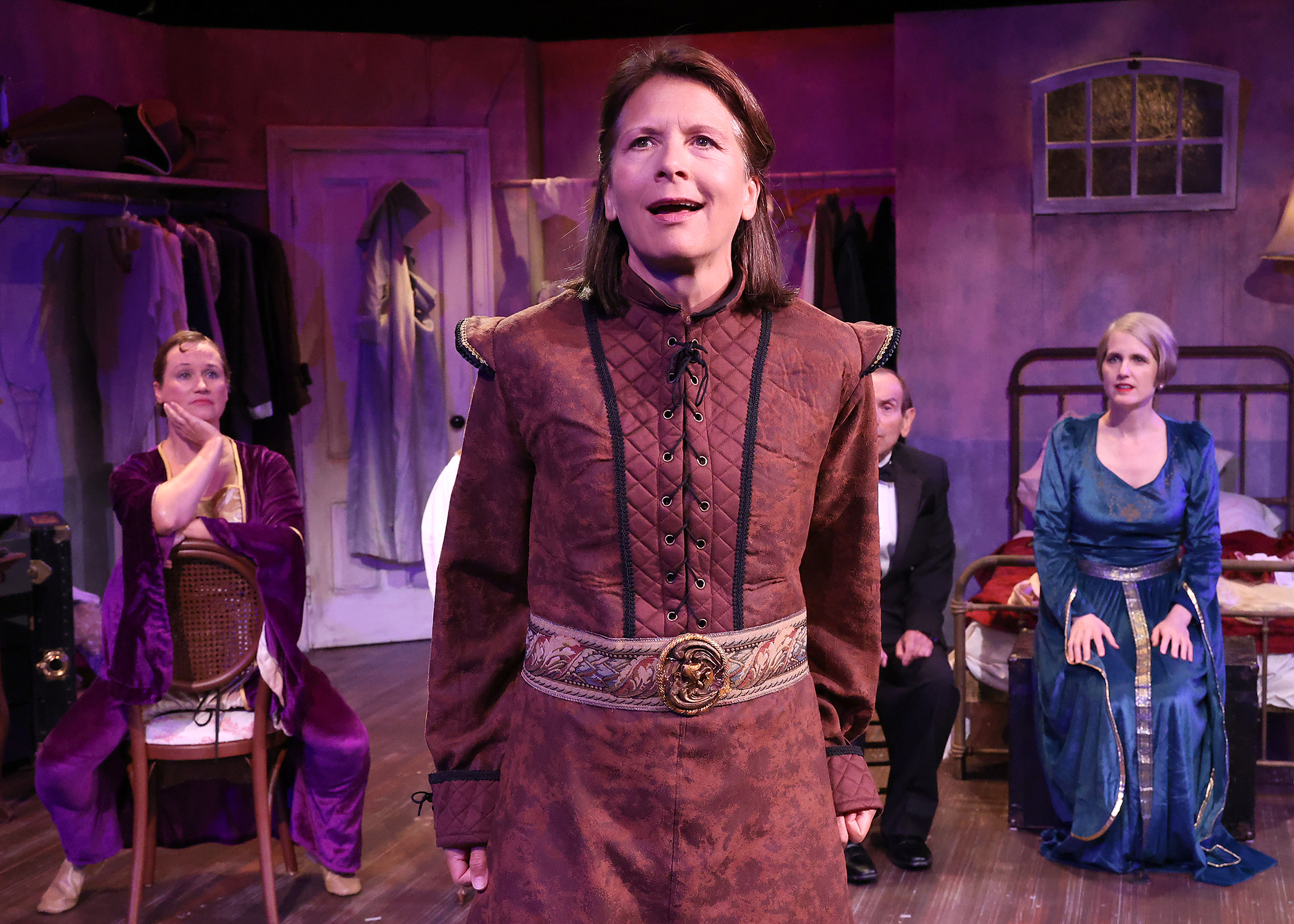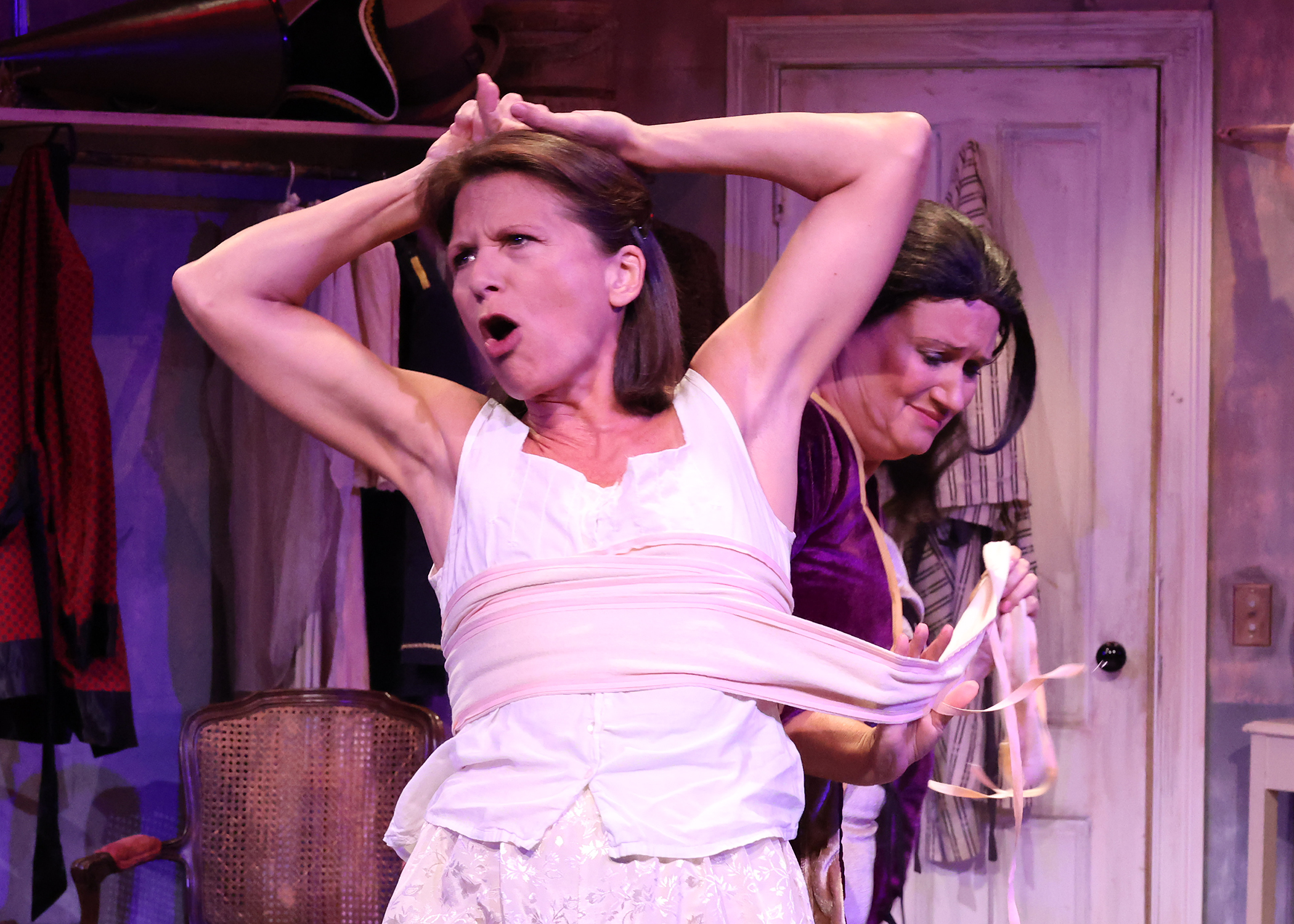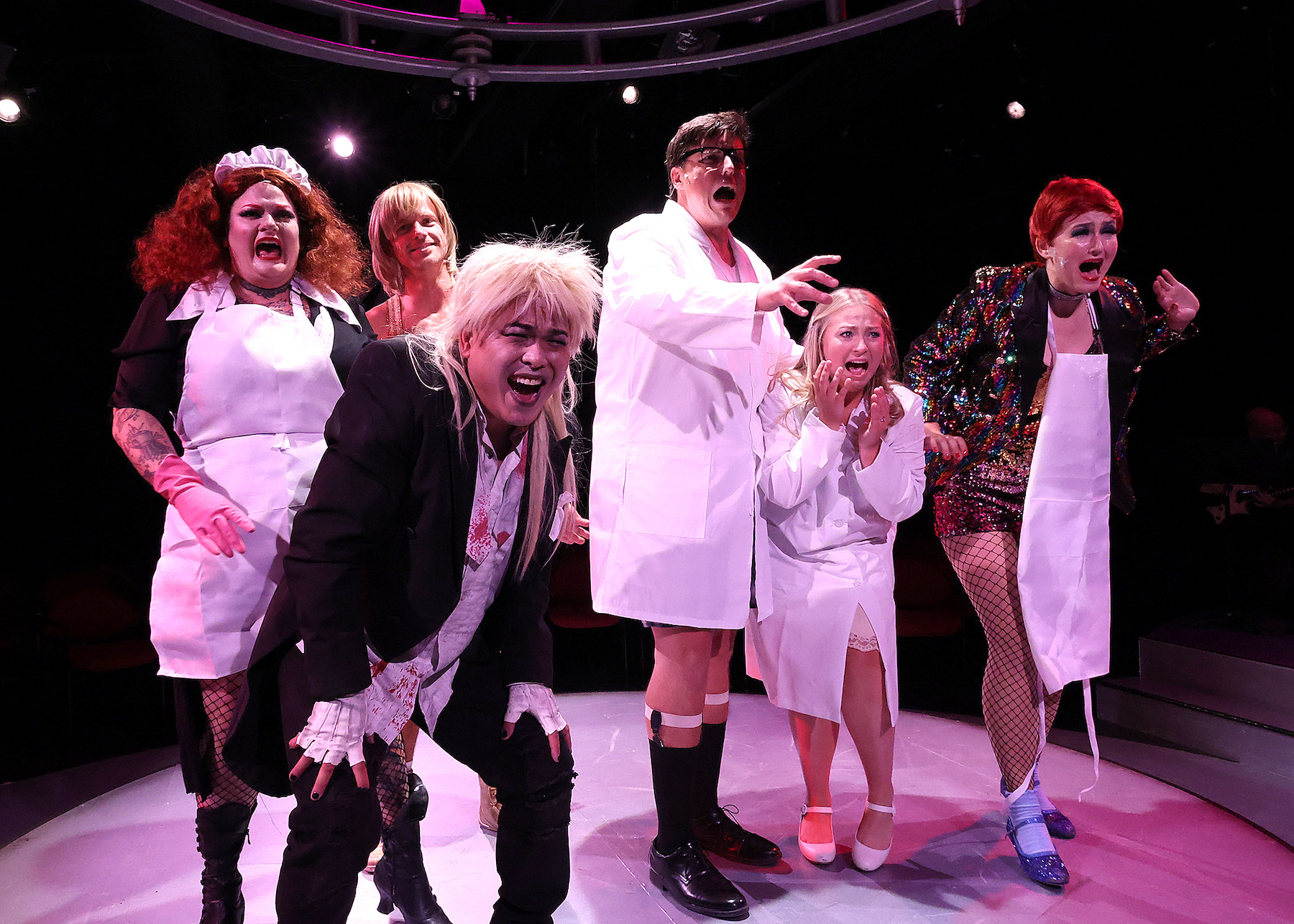
That’s No Lady: The Lady Hamlet at the Provincetown Theater

We are living through dark times. The week before the world première of The Lady Hamlet opened at the Provincetown Theater, the United States Supreme Court decided that women are now to be considered legally lesser humans. It’s easy to find oneself mired in depression.
Until one sees this play, of course. If ever we needed humor, that moment is now, and playwright Sarah Shulman and theater artistic director David Drake more than deliver. The Lady Hamlet is, in short, a hoot.

It’s 1920-something in New York City, and we first meet Margo Stayden Burns (played with unrelenting energy by Jennifer Van Dyck), her assistant/lover Frances Richards (Laura Scribner, in a role she elevates from the wallflower it might have embodied), and their associate Sam Pinsky (Brandon Cordeiro, whose facial expressions alone are worth the price of entry) as they prepare to take their production of Hamlet—with Margo in the starring role—to the stage. Alas, they find themselves without an Ophelia (the actor in question having run off with an Irish stagehand), until a replacement miraculously appears in the person of a journalist, Clara Shaw (Anne Stott, elegant and slightly mysterious), who agrees to take on the role. Margo is especially anxious, as a Jewish financier, Leo Lefkowitz (John Shuman, deliciously deadpan), is considering saving their theater and possibly even taking the production on to Broadway. But Leo has another idea: he will invest instead in Hélène de Montpelier (Kate Levy, a lesbian Sarah Bernhardt), Margo’s idol and competing Hamlet actor; to complicate the affair, it turns out that Clara is Hélène’s lover and essentially her spy in the enemy camp. As one can imagine, at a very basic almost-slapstick level, hilarity ensues.
Margo’s earliest monologues set the stage, so to speak, as she complains about Ophelia’s disappearance:
If she wasn’t already doomed to be beaten the rest of her life by a drunken Mick, I would hunt her down and beat her myself. I’d beat her face in, that imbecile. I hope she dies in childbirth. That’s the trouble with the Irish, they’re the only white people who are weak enough to be colonized. They’re too busy fucking to grow a pound of potatoes, and then they get too drunk to remember it’s their own fault that they’re starving. Idiots. Sluts. I never met an Irish girl who could keep her legs closed.
Frances reminds Margo that she is, in fact, half Irish, and the audience waits for Margo to apologize. If they believe she will, they’ve got the wrong girl. Margo’s answer is dismissive: “Well,” she says flippantly, “a fact’s a fact.”
The edginess and verve of the production come not from the plot itself but from the dialogue—which is witty, rapid-fire, and often appropriately Shakespearian—and from the deeper questions it raises, albeit hilariously, about gender roles, the universality of human emotions, and the language that both reflects and guides our understanding of society. There is, as Margo remarks, a certain irony in “a woman pretending to be a man so she can be herself.” And she isn’t too bothered by sticking to the rules:
But forget the story, forget the context. Just let the words open the doors. Whatever we find there will be a Shakespearean possibility.

Irony, in fact, abounds. It doesn’t seem accidental that Shulman chose Hamlet as the backdrop, as it were, for her comedy: the only two women in the Danish play are Ophelia and Gertrude, and Hamlet rails against each of them in misogynistic rants accusing women of being sly seductresses, pretenders, and lustful schemers. Yet now Gertrude has all but disappeared, “Ophelia” is an intelligent double agent, and Hamlet… well, that’s where the analogy goes off the rails. Margo (and, to a lesser extent, Hélène) does indeed exhibit main-character syndrome; but when Frances, Margo’s downtrodden and ever-patient lover, finally stands up for herself, she bursts out with, “You can’t be cruel and be angry about it, too.” So… does a woman playing Hamlet take on the same “male” characteristics as a man playing the role? Or is a strong woman attracted to the very characteristics that are so off-puttingly male about the prince? Is Margo trying to have it all, putting her ego first but then complaining of the limited latitude allowed her as a female in the theatre? Perhaps, as Hamlet himself would have it, the lady doth protest too much.
Shulman doesn’t answer those questions, and indeed gives us a neatly stitched ending to what is in many ways a feminist morality play; but the fact of them being raised—and raised via side-splitting comedy—is enough to give the piece gravitas in the midst of the laughter and carve out a place for itself in the canon.
That laughter is well earned. The actors’ energy onstage fairly crackles, bouncing off each other, the audience, and even the props; this is first-class acting. Drake’s sense of timing is impeccable, the pace always fast but quickening still more as momentum builds toward the inevitably neat plot conclusion. His casting and direction take full advantage of the space, the energy of each actor, and the sheer physicality they exude within their roles—they inhabit these characters, rather than merely playing them. It’s rare to find a piece in which every character is perfectly cast; this production is a world premiere and this first ensemble has given future actors a high bar to which to aspire.
And as always—always—Ellen Rousseau’s set design is award-worthy, both onstage and in the clever re-imagining orientation and audience seating. Her mise en scène hints rather than overwhelms, and allows for everything from slurping oysters and guzzling champagne to love scenes to fights.
Oh, yes, the fight: the dueling Hamlets have—what else?—a rather fabulous swordfight. It’s not subtle, and nor should it be. In Shakespeare’s version, the women are forced to make difficult, even lethal decisions to survive a politically dangerous world built for men. The same can be said for the theatre. How these women choose to overcome their own male-dominated world and make decisions about connection, sanity, and agency is both thought-provoking and wittily, gloriously comical.
While both main characters express their frustration over women’s place in the current cultural moment—wanting to be the hero rather than marrying the hero—this isn’t a play just for women. It’s not even a play just about women. It points out the limitations of gender roles and allows for its comedic gaze to expose the weakness and irrationality of those roles. And that’s a story for everyone. (Certainly the men around me at the opening were laughing uproariously… and, I think, getting it.)
Again, though, it’s a play made for our own moment in history. Hélène points out,
My dear Margo, this is the climax of your story. Our hero, Hamlette, a lovely, brilliant, selfish girl, learns that she lives in a specific historic moment, and while it is God’s grace to be a step ahead, being four steps ahead will come to no good in the end. The world is the world of others, after all.
It’s possible she’s on to something here. The yearning and struggle for an inclusive world happens in stages. Four steps ahead of one’s culture can result in repression and radical shifts of fortune; we are living through just such a time now.
Art at its best should both entertain and enable people to think deeply about themselves and the world around them. The Lady Hamlet does both… and at the same time will ensure your loudest laugh this year. Highly recommended.
The Lady Hamlet is at the Provincetown Theater from June 27 to July 21. Times and tickets here.
images: BobTucker/Focalpoint Studio
More Recent Provincetown News




 Accommodations
Accommodations  Art
Art  Bars
Bars  Books
Books  Entertainment
Entertainment  Events
Events  Featured
Featured  Guides
Guides  History
History  Literary stuff
Literary stuff  Most Popular
Most Popular  Provincetown News
Provincetown News  Restaurants
Restaurants  Reviews
Reviews  Shopping
Shopping  Theatre
Theatre  Uncategorized
Uncategorized  Weed
Weed